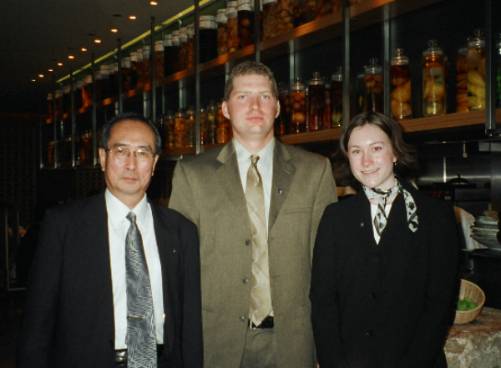The Starzen Internship Program

Mike Williams (middle) and Kapri Malesich (right) were the 2004 Starzen Interns.
In the Japanese custom of "Koden", it is appropriate to offer money as a token of esteem and respect on the occasion of someone's death. The Montana State University-Bozeman College of Business has been the beneficiary of the practice of Koden firsthand.
At the time of the death of his father, Starzen executive Seiichi Uzurahashi bestowed a gift of Koden to the College of Business. The gift resulted in an endowment which supports an internship program to promote a better understanding of Japanese culture, business practices, and perhaps most important, mutual respect. Since the program's institution in 1995, two College of Business students are selected for the program each year via a competitive application process. The internship takes place in Japan over the summer during which the students experience its diverse culture and work at the Starzen Company.
The relationship between the College and the Starzen Company began in 1991 when Seiichi Uzurahashi traveled to Bozeman and gave a lecture on "Managing Methods in a Japanese Company." The Starzen Company owned a ranch in Dillon at the time.
Over the years, Senior Starzen Company Executive K. Uzurahashi proceeded to form a strong relationship with Dr. Mike Malone, then the president of the University, and Mike Owen, the Dean of the College of Business. Although President Malone passed away in 1999 and Owen has since retired as Dean of the College, the relationship between the College and the Starzen Company remains strong. As a testament to its vigor, the internship program, now in its 9th year, continues to send annually two of the College's finest students.
This summer, Mike Williams of Great Falls and Kapri Malesich of Dillon will travel to Japan to work at Starzen.
Williams, a senior student in accounting speaks of two reasons he chose to apply for the internship. "I was motivated to apply for the Starzen internship in order to learn about the business practices and culture of the Japanese in order to better understand how to do business with them," he said. "Also, my Japanese relatives have fostered my interest in the Japanese culture over the years."
"The language or communication barrier is what I think about the most," he added. "I just hope that I have learned enough Japanese to get around okay and to communicate with co-workers and people I meet."
John Morse, once the president and CEO of the Dillon ranch, acknowledges that cultural differences present a learning opportunity. "Fitting into a group is likely the most difficult challenge for anyone from either culture," said Morse. "Once accepted and you become part of 'the group' you will begin to view things from the inside and enjoy the security the group affords."
For Malesich who is a junior in the accounting program and whose family sold cattle to the former Starzen ranch near Dillon, the trip will have additional meaning. "Discovering that Starzen was an agricultural company I already knew something about made me even more curious to learn more and to see the similarities and differences in how they do things in Japan," Malesich said. "That is what really inspired me to apply for the internship."
"I also hope to learn more about how the company runs their global agriculture business and compare it to how we do things in the U.S.," she said. "I believe I will come back a more well-rounded person and that this experience will enhance my understanding of business on a global scale."
What began as a singular gift of respect and honor now annually provides business students with a unique opportunity that will last a lifetime.

